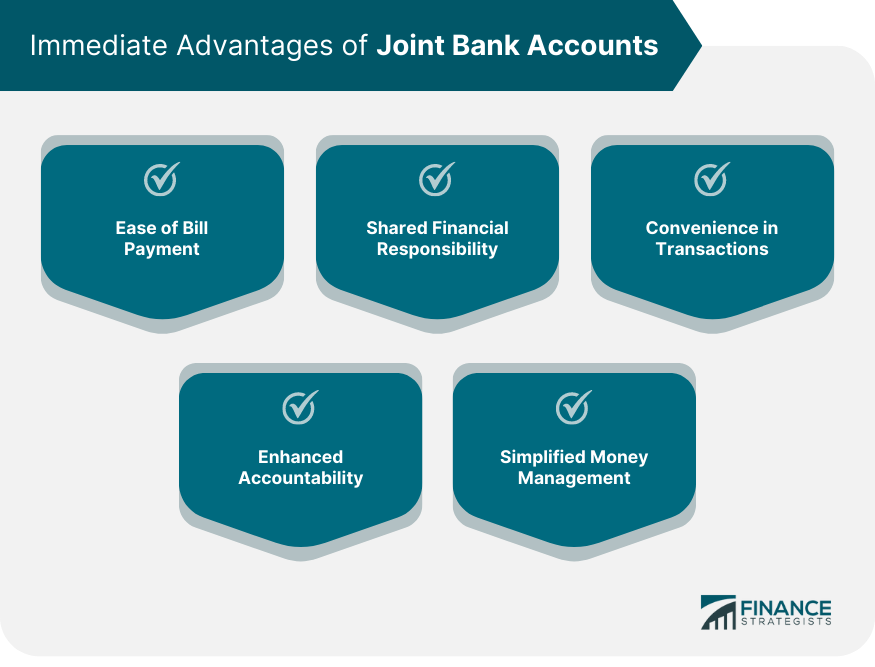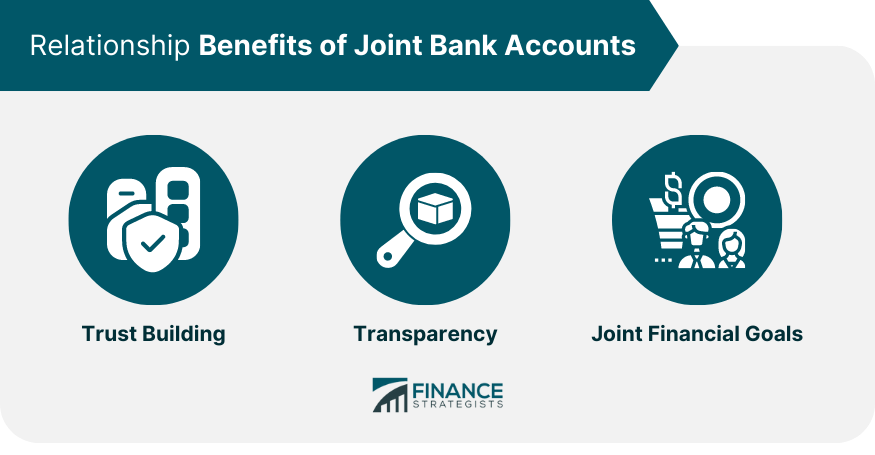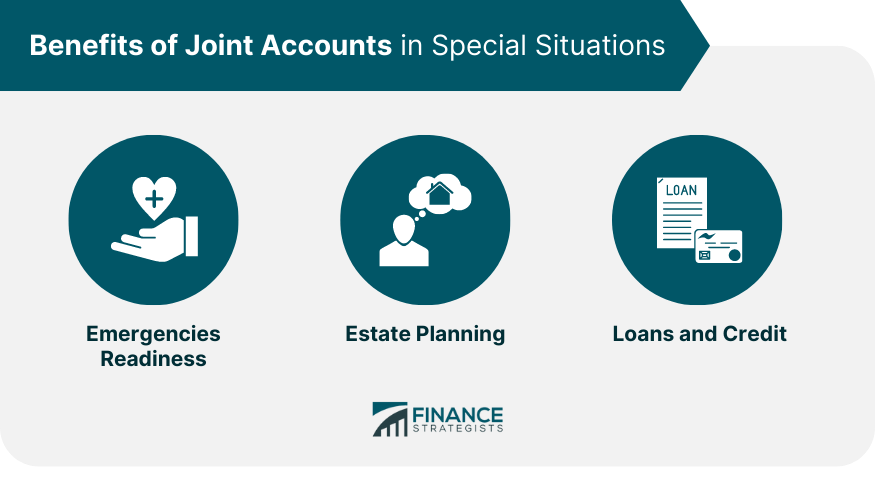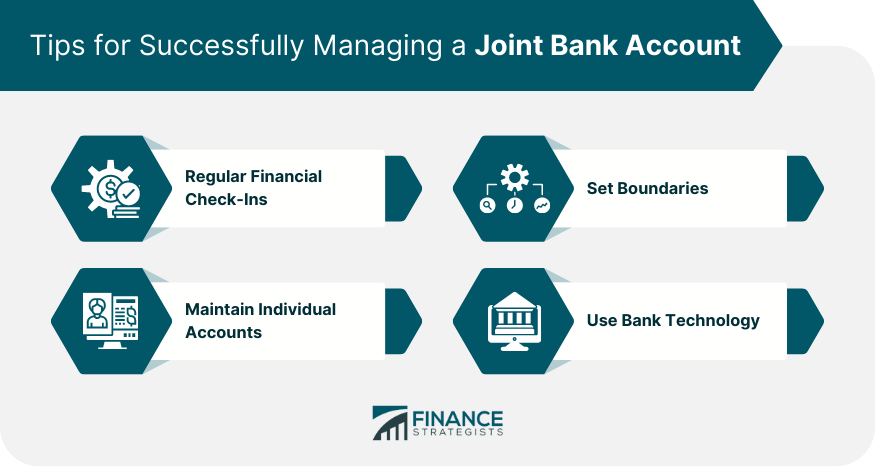A joint bank account is a financial arrangement where two or more individuals share ownership and access to a single account. This type of account is commonly used among family members, couples, business partners, or any group of people who want to manage their finances collectively. Joint bank accounts offer a wide array of benefits that make them an appealing financial arrangement for various individuals and groups. Whether it's a couple seeking to merge their finances, business partners pooling resources, or family members coordinating expenses, joint accounts provide several advantages that cater to different needs and situations. Joint bank accounts pave the way for simpler management of household finances. With both parties' income funneling into a single account, recurring expenses such as mortgages, utilities, or subscription services can be paid without the hassle of transferring money or dividing responsibilities. Shared accounts naturally promote a sense of collective responsibility. Both parties can actively contribute to, monitor, and take responsibility for the account. This tandem approach fosters teamwork in money management, distributing the weight of financial obligations. Gone are the days of waiting for one person to settle the bill. With joint bank accounts, multiple account holders can enjoy individual checkbooks or debit cards, empowering each to conduct transactions, make purchases, and withdraw funds without constraints. When two individuals share a bank account, each transaction becomes visible to both parties. This level of transparency can discourage frivolous spending and encourage more thoughtful financial decisions, promoting accountability. Joint accounts can help declutter your financial landscape. Instead of juggling multiple accounts and determining who pays what, consolidating funds streamlines budgeting, saving, and expenditure processes. Opening a joint bank account can be a significant step in a relationship. It’s a commitment that speaks volumes about trust. Sharing such an intimate part of life, your finances reinforce mutual trust and confidence. Joint accounts remove the cloak of financial secrecy. With every transaction visible to both account holders, it becomes nearly impossible to hide any financial activity. This transparency fosters open dialogue about expenditures, savings, and financial aspirations. With a shared pot of resources, it becomes considerably more straightforward to save for collective goals. Whether it's planning a dream vacation, purchasing a home, or investing in mutual interests, a joint account can be the catalyst propelling you toward those targets. In the face of adversity or sudden emergencies, accessibility to funds becomes paramount. Joint accounts ensure that both parties can swiftly access necessary finances without the impediments of transfer delays or authorization requirements. Should one account holder, unfortunately, pass away, a joint bank account can significantly simplify the process of transferring funds or assets. The surviving member often retains access, eliminating the need for complex legal procedures. When considering lending options or credit applications, a joint account showcasing consistent income and responsible expenditure can sometimes bolster your creditworthiness in the eyes of financial institutions. In scenarios where elderly individuals require assistance in managing their finances, joint accounts can provide caregivers or family members with the necessary access to oversee transactions, ensuring bills are timely paid, and the account remains in good standing. With an additional person monitoring the account, it becomes harder for unscrupulous individuals to exploit the elderly. The joint nature of the account offers an additional layer of protection against potential financial abuse. While joint accounts offer many benefits, they can also be a breeding ground for disputes, especially if spending habits differ. Establishing joint financial goals or setting a budget can help align priorities and prevent conflicts. With two people accessing funds, there's a heightened risk of depleting the account inadvertently. Regular communication, setting spending alerts, or even considering overdraft protection can be useful strategies to prevent such scenarios. Life is unpredictable. If a relationship ends, a joint account can become a point of contention. It’s crucial to have a plan or agreement in place detailing how funds will be divided or managed if the relationship changes. It's essential for co-holders of a joint bank account to regularly discuss their finances. By setting monthly or bi-monthly meetings, both parties can remain informed about the state of their shared finances. These check-ins act as preventive measures, catching any potential financial issues early on, ensuring aligned goals, and fostering open communication about spending habits and saving goals. Pooling resources in a joint account certainly brings convenience, but it's equally crucial to ensure each person respects the other's financial perspectives. By setting clear spending limits or defining certain expenditure categories, both parties can be assured their individual financial preferences are taken into account. This promotes a harmonious financial relationship, minimizing potential conflicts. Even with a joint account, there's value in maintaining personal accounts. Individual accounts cater to personal expenditures, allowing for surprise purchases or gifts without affecting the shared funds. Having this separate financial space can be a safeguard against disagreements, ensuring both parties can exercise a degree of financial independence. With technological advancements in the banking sector, managing joint accounts has never been easier. Modern tools, from real-time transaction alerts to user-friendly budgeting apps, enable account holders to stay updated and efficiently manage their shared finances. Utilizing these tools not only streamlines account management but also introduces transparency and ease in day-to-day financial operations. Joint bank accounts hold many advantages, from streamlining household finances to promoting financial transparency and accountability. They simplify monetary management, enabling easier payment of bills, fostering shared financial responsibilities, and offering convenience in transactions. Importantly, these accounts can strengthen relationships by building trust through open financial dialogues and the alignment of joint financial goals. Special situations such as emergencies, estate planning, and loan considerations further highlight their utility. They are especially beneficial for senior citizens and their caregivers, facilitating easy accessibility and protection from financial exploitation. However, it's crucial to be mindful of potential challenges such as spending disagreements, the risk of overdrawing, and the impacts of relationship changes. Mitigating these through regular financial check-ins, setting spending boundaries, maintaining individual accounts, and leveraging banking technology is pivotal. As such, while joint accounts aren't a universal solution, they can be instrumental in fostering healthy financial habits and relationships when managed effectively.Joint Bank Accounts: Overview
Immediate Advantages of Joint Bank Accounts
Ease of Bill Payment
Shared Financial Responsibility
Convenience in Transactions
Enhanced Accountability
Simplified Money Management

Relationship Benefits
Trust Building
Transparency
Joint Financial Goals

Benefits in Special Situations
Emergencies Readiness
Estate Planning
Loans and Credit

Considerations for Senior Citizens and Caretakers
Accessibility for Caretakers
Protection Against Exploitation
Potential Pitfalls and How to Navigate Them
Disagreements on Spending
Risk of Overdrawing
Potential Relationship Changes
Tips for Successfully Managing a Joint Bank Account
Regular Financial Check-Ins
Set Boundaries
Maintain Individual Accounts
Use Bank Technology

Final Thoughts
Benefits of Joint Bank Accounts FAQs
A joint bank account is an account held in the names of two or more individuals. It allows all named parties to deposit, withdraw, and manage the funds collectively.
Sharing a bank account requires transparency in financial dealings and promotes open communication about money. This transparency and collaboration can build and reinforce trust between account holders.
Yes, potential risks include disagreements on spending habits, the danger of overdrawing, and complications if the relationship between account holders changes. It's crucial to communicate openly and set boundaries to navigate these challenges.
Maintaining individual accounts can be beneficial. It allows for personal spending freedom, the ability to make surprise purchases or gifts, and can act as a safety net in case of disagreements or relationship changes.
Modern banking technology offers tools like transaction alerts, digital budgeting apps, and mobile access, which can simplify account management, improve transparency, and ensure both parties remain informed about the account's status.
True Tamplin is a published author, public speaker, CEO of UpDigital, and founder of Finance Strategists.
True is a Certified Educator in Personal Finance (CEPF®), author of The Handy Financial Ratios Guide, a member of the Society for Advancing Business Editing and Writing, contributes to his financial education site, Finance Strategists, and has spoken to various financial communities such as the CFA Institute, as well as university students like his Alma mater, Biola University, where he received a bachelor of science in business and data analytics.
To learn more about True, visit his personal website or view his author profiles on Amazon, Nasdaq and Forbes.













